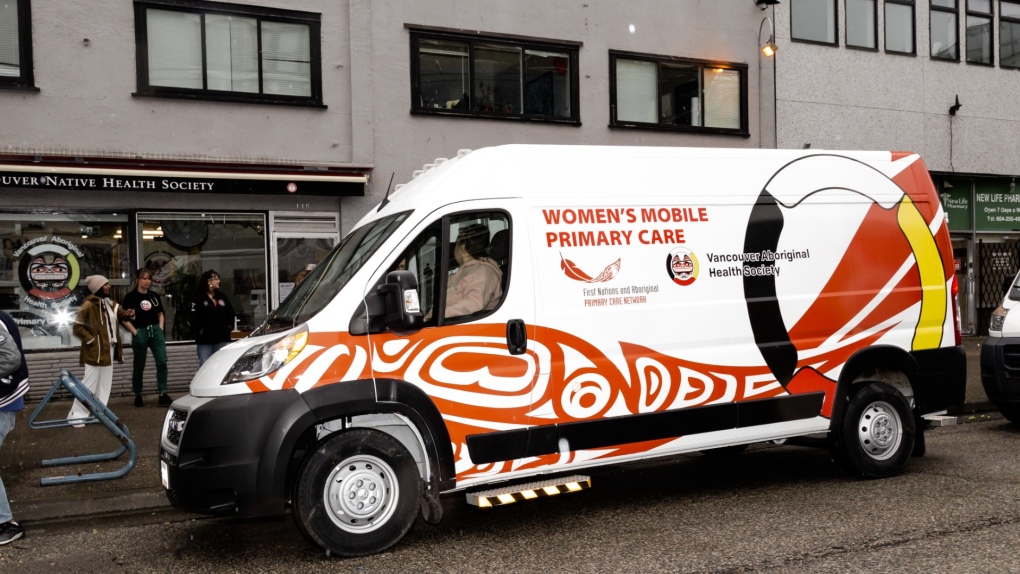Mobile women's health clinic launches on the Downtown Eastside
 A mobile medical clinic for women has launched on Vancouver's Downtown Eastside. (Image credit: Vancouver Aboriginal Health Society)
A mobile medical clinic for women has launched on Vancouver's Downtown Eastside. (Image credit: Vancouver Aboriginal Health Society)
A new program on Vancouver's Downtown Eastside will help connect women to vital primary health care services, eliminating barriers in an attempt to save lives.
"This is our most vulnerable population, the women are so vulnerable," said Rosemary Stager-Wallace, the executive director of Vancouver Aboriginal Health Society.
"We really seriously feel that this van is going to save lives."
The Women’s Mobile Primary Care Program is a partnership between the Vancouver Aboriginal Health Society and the First Nations Aboriginal Primary Care Network. The van will operate three days a week, to start, and will be parked outside of the Cosmopolitan Hotel, Ravens Lodge and the Downtown Eastside Women’s Centre. All services will be available by drop-in, and no ID or care card is required.
"This is to really reach the women where they're at and really eliminate a lot of the barriers that they face in accessing the care that they need," Stager-Wallace said, noting that while some barriers are straightforward and logistical, others are more insidious and systemic.
"We do have a high population of Indigenous women, and they don't feel safe or they have a fear of racism within the health-care system. If you have an addiction, you tend to be judged harshly."
The mobile clinic will offer general check-ups as well as sexual and reproductive health care including pap smears, birth control, and STI testing. All of the services will be delivered in a culturally safe and supportive environment, with an all-woman team comprised of Indigenous knowledge keepers, elders and healers working alongside doctors, nurses, and social workers.
"A lot of the Indigenous women were in the '60s Scoop or were in the foster care system, and just don't have that much connection to their culture," Stager-Wallace said, adding that the care provided emphasizes a holistic approach to health.
"We want it to feel as safe as possible for the women to access the care.
A neighbourhood profile published by Vancouver Coastal Health in 2013 outlined some of the same concerns that Stager-Wallace said the mobile program is trying to address. It identified "poverty, discrimination, trauma, and violence" as among the issues disproportionately faced by residents of the Downtown Eastside. Rates of premature death and communicable diseases were found to be the highest of any area in the city.
"Many traditional services do not adequately serve these highly vulnerable populations, and challenges faced include identifying innovative approaches to primary care, specialty medical care, dental care, and mental health care for those populations who are the most vulnerable and marginalized in the city," the report found.
In the 10 years since it was published, new crises have emerged including a drug poisoning epidemic that has killed more than 11,000 people in the province since 2016. Other crises have persisted or worsened, including rates of homelessness and violence against Indigenous women and girls.
"We need to do something different because we're losing so many people every day on the Downtown Eastside. We need to try to think outside the box and change the way we're doing things," Stager-Wallace said.
The exact hours of operation for the mobile program are still being finalized.
CTVNews.ca Top Stories

BREAKING Donald Trump picks former U.S. congressman Pete Hoekstra as ambassador to Canada
U.S. president-elect Donald Trump has nominated former diplomat and U.S. congressman Pete Hoekstra to be the American ambassador to Canada.
Genetic evidence backs up COVID-19 origin theory that pandemic started in seafood market
A group of researchers say they have more evidence to suggest the COVID-19 pandemic started in a Chinese seafood market where it spread from infected animals to humans. The evidence is laid out in a recent study published in Cell, a scientific journal, nearly five years after the first known COVID-19 outbreak.
This is how much money you need to make to buy a house in Canada's largest cities
The average salary needed to buy a home keeps inching down in cities across Canada, according to the latest data.
'My two daughters were sleeping': London Ont. family in shock after their home riddled with gunfire
A London father and son they’re shocked and confused after their home was riddled with bullets while young children were sleeping inside.
Smuggler arrested with 300 tarantulas strapped to his body
Police in Peru have arrested a man caught trying to leave the country with 320 tarantulas, 110 centipedes and nine bullet ants strapped to his body.
Boissonnault out of cabinet to 'focus on clearing the allegations,' Trudeau announces
Prime Minister Justin Trudeau has announced embattled minister Randy Boissonnault is out of cabinet.
Baby dies after being reported missing in midtown Toronto: police
A four-month-old baby is dead after what Toronto police are calling a “suspicious incident” at a Toronto Community Housing building in the city’s midtown area on Wednesday afternoon.
Sask. woman who refused to provide breath sample did not break the law, court finds
A Saskatchewan woman who refused to provide a breath sample after being stopped by police in Regina did not break the law – as the officer's request was deemed not lawful given the circumstances.
Parole board reverses decision and will allow families of Paul Bernardo's victims to attend upcoming parole hearing in person
The families of the victims of Paul Bernardo will be allowed to attend the serial killer’s upcoming parole hearing in person, the Parole Board of Canada (PBC) says.

































